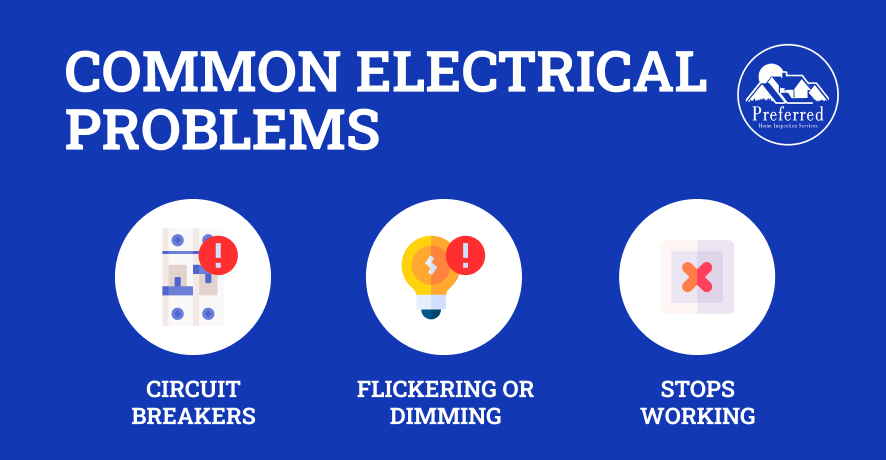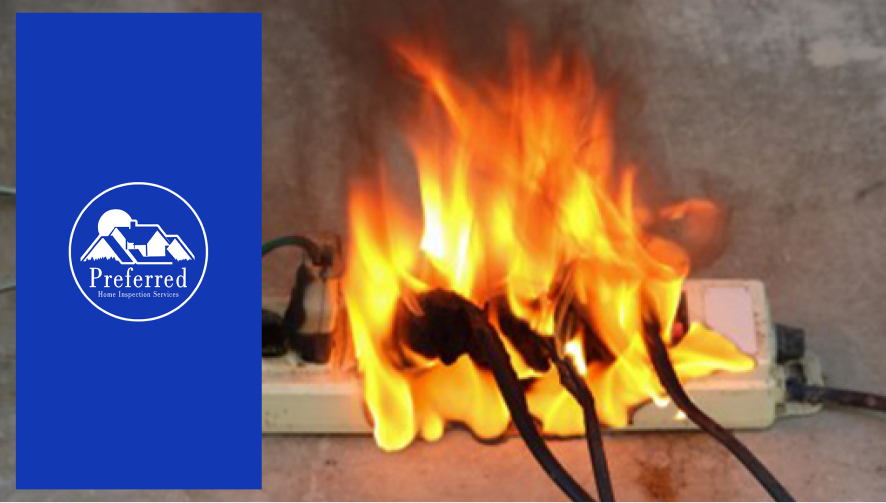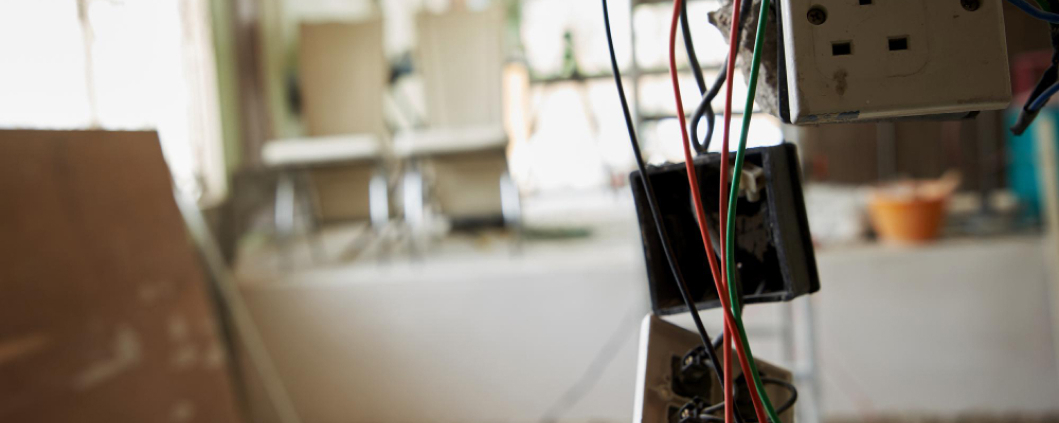Electrical safety includes preparing your Delaware home for inspection to the common issues and the know-how to identify them before they escalate. As homes age and technologies evolve, electrical systems often struggle to keep pace, leading to various issues, from minor nuisances to severe hazards.
Importance of Electrical Safety in Delaware Homes
The hidden wiring and circuits running through our homes are often taken for granted, but they bear the weight of modern living.
Nearly 51,000 electrical fires occur annually in the U.S., resulting in around 500 tragic deaths and over $1 billion in property damage, so the stakes are high.
A poorly maintained electrical system is one of the most common issues uncovered during home inspections, leading to unpredictable and disastrous consequences.
Specific Concerns for Delaware Homes
Delaware’s unique climate and architectural diversity make for a fascinating backdrop, but they can also spell trouble for a home’s electrical system.
The sweltering heat of summer and the biting chill of winter put immense pressure on your HVAC system, which often relies heavily on air conditioning to keep temperatures comfortable. This increased demand strains older electrical setups, not originally designed to withstand modern power consumption.
The state’s damp coastal air exacerbates major issues, such as corrosion and moisture, both of which wreak havoc on wiring and connections.
Adding to the complexity, Delaware’s homes reflect a broad architectural history, ranging from charming colonial-era houses to sleek contemporary designs.
Older homes often harbor outdated wiring that poses significant fire risks, while newer constructions aren’t immune to shoddy electrical installations that can also threaten safety.

Key Electrical Challenges in Delaware Homes: A Visual Guide
Identifying Common Electrical Problems
Frequent Circuit Breaker Trips
Circuit breakers are designed to protect your home by cutting off power when they detect an overload, short circuit, or ground fault. When a circuit breaker frequently trips, it’s a clear indication that your home’s electrical system is under duress. Common culprits include overloaded circuits, faulty appliances, or wiring issues.
To address frequent breaker trips, first unplug appliances and devices connected to the circuit and then reset the breaker.
If it trips again with minimal load, you may need to consult a licensed electrician to investigate underlying problems like faulty wiring or an outdated electrical panel.
Flickering or Dimming Lights
Flickering or dimming lights often hint at issues with your home’s electrical system.
While temporary flickering during storms or power surges can be normal, persistent flickering or dimming may signal more serious problems.
Loose connections, faulty switches, or an overloaded circuit could be to blame.
If the issue persists or occurs frequently, it’s best to have a professional electrician diagnose the problem to rule out potential hazards or malfunctions.
Outlets Not Working
When an outlet suddenly stops working, it’s often due to a tripped breaker, a tripped ground fault circuit interrupter (GFCI), or loose wiring.
Start by checking the circuit breaker panel and resetting any tripped breakers.
If the outlet still doesn’t work, locate and reset the GFCI outlet, which may control the non-functional outlet.
If these steps fail, inspect the outlet for signs of damage or wear. Remember to exercise caution when inspecting electrical fixtures, and turn off the power at the circuit breaker before attempting any repairs.
Signs of Potential Electrical Hazards
Burning Smell from Outlets or Switches
A burning smell emanating from outlets or switches is a serious red flag that something’s wrong. This odor typically indicates overheating due to faulty wiring, a loose connection, or an overloaded circuit, all of which pose significant fire risks.
If you detect a burning smell, immediately switch off power to the affected area at the breaker box and consult a licensed electrician.
Discolored Outlets or Switch Plates
Discoloration on outlets or switch plates often indicates overheating, which loose wiring, overloaded circuits, or faulty outlets could cause. Such discoloration is a telltale sign of electrical arcing or melting plastic, both of which could spark an electrical fire.
Refrain from using discolored outlets and switch plates, and have a professional inspect and repair the issue promptly to prevent further hazards.
Buzzing Sounds from Electrical Panels or Outlets
Buzzing or humming noises emanating from electrical panels or outlets usually suggest an electrical fault. These sounds often indicate loose connections, overloaded circuits, or failing components, each posing a risk of electrical shock or fire.
Ignoring these sounds could lead to equipment failure, fire hazards, or even electrical shock, so don’t delay in seeking professional help.

Preventing Electrical Hazards: The Risk of Overloaded Outlets in Delaware Homes
How to Prevent Electrical Issues in Your Home
Regular Electrical Inspections
Routine professional inspections are the cornerstone of electrical safety in your home. A qualified electrician can detect early signs of wear and tear, faulty wiring, or overloaded circuits that might go unnoticed to the untrained eye.
For Delaware homes, home inspection experts recommend scheduling an electrical check-up every three to five years, or sooner if your home is older or has experienced significant electrical upgrades.
Regular home inspection in Hockessin, DE, can uncover potential hazards before they escalate, providing peace of mind and a safer living environment.
Upgrading Old Electrical Wiring
Outdated wiring can struggle to keep up with the demands of modern appliances and electronics, posing safety risks like electrical fires.
Telltale signs that your home’s wiring needs an upgrade include frequent breaker trips, flickering lights, and discolored outlets.
Upgrading your wiring boosts safety and improves energy efficiency and the overall reliability of your home’s electrical system.
With updated wiring, you can comfortably use multiple appliances simultaneously without fear of overloading the system.
Installing Surge Protectors
Surge protectors offer valuable protection for your electronics and appliances from power surges that can occur during storms, power outages, or other electrical disruptions.
By diverting excess electricity away from your devices, they prevent damage and prolong the lifespan of your electronics.
Whole-house surge protectors, installed at the electrical panel, offer comprehensive protection, while plug-in surge protectors provide localized defense.

What to Do If You Encounter an Electrical Issue
Steps to Take When You Notice an Electrical Problem
When faced with an electrical problem, the first priority is safety. To prevent potential damage or hazards, turn off the power at the circuit breaker for the affected area.
For problems like a burning smell, buzzing noises, or flickering lights, avoid using the faulty fixture and keep the area clear.
If the issue seems minor and you have the appropriate skills, you can safely mitigate it by unplugging devices or resetting breakers.
However, for more serious concerns, it’s best to leave the repairs to a professional.
When to Call a Professional Electrician
If you encounter frequent breaker trips, burning smells, or buzzing sounds, or if you’re unsure about the safety of your electrical system, it’s best to seek expert intervention.
Finding a qualified electrician in Delaware involves checking for proper licensing, reading customer reviews, and ensuring they have experience with the specific issues in your home.
Professional electricians can accurately diagnose problems and provide safe, lasting solutions.
Conclusion: Maintaining a Safe Electrical System
Regular inspections, wiring upgrades, and surge protection significantly reduce the risk of electrical issues, enhance property value, and safeguard both your property and loved ones.
So, by staying vigilant and addressing problems promptly, Delaware homeowners can keep their homes powered safely and efficiently, ensuring a bright future for years to come.


